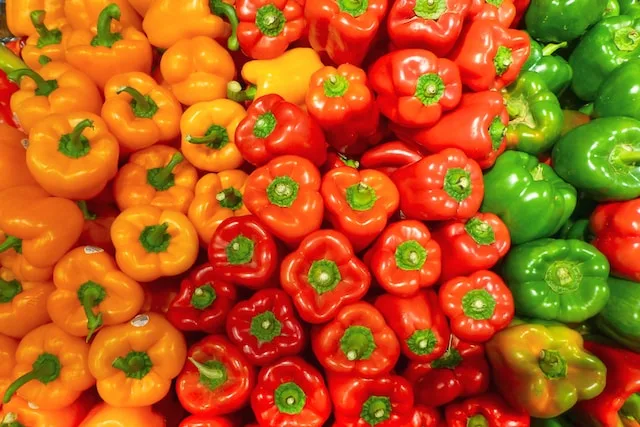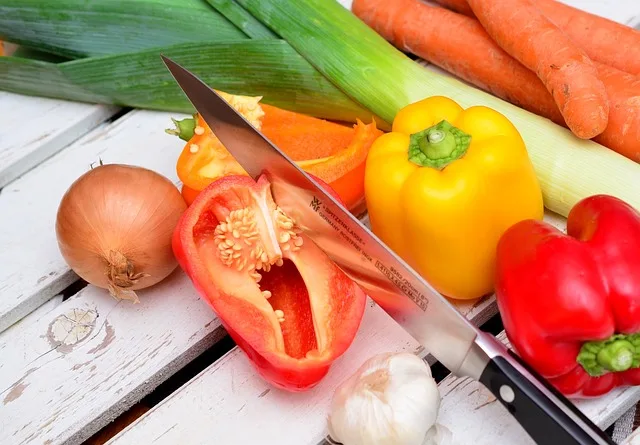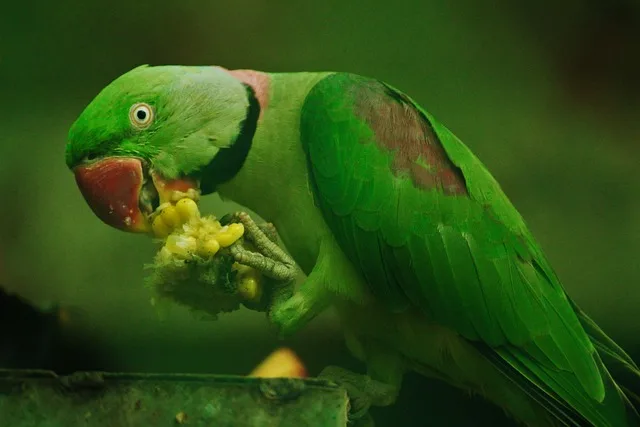Can parrots eat bell peppers? This question has puzzled many bird owners seeking to provide a diverse and nutritious diet for their feathered companions. The good news is that bell peppers can indeed be a delightful addition to a parrot’s menu. With a range of bell pepper varieties available, it’s important to understand which ones are safe and beneficial for these vibrant creatures.
In this comprehensive article, we will unlock the delicious secret behind parrots and bell peppers, revealing five surprising facts that every parrot owner should know. From understanding the spice levels of different peppers to knowing whether seeds and stems should be included, we’ll explore the nuances of feeding peppers to parrots.
While some peppers may be too spicy for parrots, others, such as bell peppers, offer a colourful and nutritious snack for these intelligent birds. Discover the benefits of incorporating bell peppers into your parrot’s diet and learn about any precautions or considerations to ensure their well-being.
Join us on this enlightening journey as we uncover the truth about parrots and peppers, providing valuable insights to help you make informed decisions regarding your feathered friend’s diet. Get ready to be amazed by the surprising facts that await in our exploration of this delicious secret!
Table of Contents
Unveiling the Colorful Nutritional Spectrum: Bell Peppers and Their Parrot Delights
When it comes to peppers, bell peppers are a unique and versatile member of the family. While they are related to their spicy chili pepper counterparts, bell peppers differ significantly in various aspects. They showcase a wide array of vibrant colors, are larger in size, and possess a milder and sweeter taste. These characteristics make them a favored choice for culinary enthusiasts and health-conscious individuals alike.
Originating from Central and South America, bell peppers have become a staple in kitchens worldwide. One of their advantages is their availability throughout the year, making them easily accessible at local grocery stores. With their glossy, waxy outer coating and a crisp and crunchy texture inside, bell peppers offer a delightful eating experience.
Upon slicing open a bell pepper, one will discover a hollow interior filled with numerous tiny seeds attached to a white inner membrane. These seeds are of particular interest, as we will later explore whether they hold any potential toxicity for our beloved parrots.
Bell peppers come in a captivating range of colors, including green, yellow, red, and orange. The color of a bell pepper is an indication of its maturity. The journey begins with a vibrant green hue, which gradually transitions into a sunny yellow, followed by a warm orange, and finally matures into a rich red color. It’s important to note that the taste profile also evolves with the changing colors. Green peppers tend to be more bitter, while yellow and orange peppers offer a sweeter flavor. Among them, red bell peppers reign as the sweetest and least bitter variety.
Although the core vegetable remains the same, each bell pepper color boasts distinct nutritional benefits. By exploring the spectrum of colors, we can uncover a diverse array of nutrients that contribute to our parrot’s well-being. Join us as we delve deeper into the surprising facts surrounding bell peppers and their suitability for our feathered friends.
What nutritional benefits are there in bell peppers for my parrot?

With regards to nourishment, bell peppers offer a scope of important advantages for our parrot companions. Each color of bell pepper brags its own set extraordinary nourishing benefits, making them a colorful and healthy expansion to their diet.
Crude bell peppers, paying little heed to color, are packed with vitamin C while containing low degrees of sugar. This is particularly beneficial for parrots, as they require a low-sugar diet to stay away from medical problems such as corpulence. Furthermore, bell peppers are low in calories, permitting your parrot to appreciate them as a scrumptious and sound snack without stressing over excessive sugar or caloric admission.
Eminently, bell peppers are an exceptional source of vitamin C, giving a significant piece of your parrot’s recommended day to day admission. Since parrots, similar to people, don’t normally produce vitamin C, incorporating food varieties rich in this imperative supplement, such as bell peppers, becomes fundamental for their prosperity.
Aside from vitamin C, bell peppers additionally offer a variety of other fundamental minerals. They are a decent source of potassium, folic acid, and fiber, all of which advance sound processing in your parrot. These minerals assume a crucial part in keeping a smooth-running gastrointestinal system, guaranteeing ideal supplement retention.
Red bell peppers stand apart for their dietary benefit, as they contain vitamins that are not viewed as in green, orange, or yellow peppers. Vitamin A, for instance, is exclusively tracked down in red peppers and assumes a crucial part in forestalling deficiencies that can appear as side effects like sniffling and wheezing in parrots.
While red peppers have higher supplement content because of their more extended development on the plant, it’s vital to take note of that green peppers are as yet a protected and sound choice. Green peppers, as well, offer more than adequate vitamin C, especially when they are completely ready and progress into red. They likewise contain a modest quantity of iron, contributing to your parrot’s blood oxygenation.
Incorporating an assortment of bell pepper colors into your parrot’s diet adds flavor and vibrancy as well as guarantees a different scope of supplements. From vitamins An and B6 to folic acid and lutein, bell peppers offer a nutritious package that upholds your parrot’s general wellbeing. Their cell reinforcement properties may likewise give protection against sicknesses such as cardiovascular issues and certain cancers. Besides, the compounds present in bell peppers might assist with reducing fiery conditions like joint pain.
By understanding the dietary advantages of bell peppers and the specific benefits of each color, you can pursue informed decisions to keep your parrot cheerful, sound, and all around sustained.
What Parts of a Bell Pepper Can My Parrot Eat?

When it comes to bell peppers, it’s important to know which parts of this healthy vegetable are safe for your parrot’s consumption and which parts should be avoided. Understanding these details ensures that you provide a safe and enjoyable dining experience for your feathered friend.
A bell pepper consists of three main components: the stem, the crunchy outer vegetable, and the membrane inside that is filled with seeds. While caution should be exercised with seeds and pits of various fruits and vegetables, bell pepper seeds are completely safe for your parrot to eat. In fact, many owners choose to feed their parrots both the seeds and the membrane to avoid any food wastage.
However, if you notice that your parrot is initially hesitant or dislikes the taste of bell peppers, you can try removing the membrane and seeds. The seeds contribute to a slightly bitter taste, which might not appeal to parrots with a preference for sweeter foods. By removing the seeds, you can make the pepper more palatable for your pet.
If you find that your parrot prefers sweeter flavors, consider serving them red peppers instead of green ones. Red peppers tend to be sweeter and less bitter than their green counterparts, making them a more enticing option for your parrot’s taste buds.
Removing the seeds from a bell pepper is a simple task. If you’re feeding your parrot an entire pepper, open the top and scoop out the membrane and seeds from the inside. However, if you’re offering your parrot only a half or quarter of a pepper, you can use a knife to peel off the white membrane that attaches the seeds to the pepper.
Can your parrot eat the stem of the bell pepper?
When it comes to bell peppers, it’s essential to pay attention to the different parts of the vegetable and their suitability for your parrot’s consumption. One part that should never be given to your parrot under any circumstances is the stem. Apart from being the thicker and less flavorful portion of the pepper, the stem can pose potential dangers to your feathered companion.
Bell peppers belong to the nightshade family, which includes various fruits and vegetables. Many plants in this family have stems and leaves that are toxic to both humans and animals. Therefore, it is crucial to avoid feeding the stem of the bell pepper to your parrot to ensure their well-being.
Removing the stem from the bell pepper is a simple task that can be done with a knife. By eliminating the stem, you allow your parrot to access the inside of the pepper more easily, where the nutritious and safe parts reside.
Always prioritize the safety of your parrot by keeping them away from any potentially harmful components of the bell pepper. While the stem may seem harmless, the toxic properties associated with nightshade plants make it an important part to exclude from your parrot’s diet.
By being vigilant and removing the stem, you can ensure that your parrot enjoys a tasty and safe culinary experience with bell peppers. Remember, the inside of the pepper holds the nutritional benefits, making it the ideal part to offer your parrot while keeping them happy and healthy.
How Long Can I Store Bell Peppers?
With regards to the time span of usability of bell peppers, their strength can change contingent upon how they are put away and ready. By and large, crude bell peppers can last one to about fourteen days, yet this can be reached out by putting away them in the fridge as opposed to at room temperature.
By refrigerating your bell peppers, you can keep up with their newness and quality for a more drawn out period. The cool temperature dials back the maturing system and restrains microbial development, which can prompt deterioration. Notwithstanding, it’s essential to take note of that this time span of usability applies to crude bell peppers.
Assuming you decide to take care of your parrot cooked bell peppers, it’s essential to know that the lapse date recoils fundamentally. Cooked bell peppers ought to be consumed inside 3 to 5 days to guarantee their wellbeing and nutritional worth.
While new vegetables are by and large liked over cooked or frozen ones, freezing bell peppers can be a suitable choice for broadening their time span of usability and acquainting some assortment with your parrot’s eating routine. Freezing bell peppers can assist with protecting their flavors and supplements for a drawn out period. In any case, it’s essential to appropriately store them in impenetrable compartments or cooler sacks to forestall cooler consume and keep up with their quality.
Keep in mind, with regards to taking care of your parrot bell peppers, new and crude peppers are regularly the favored decision because of their ideal nutritional substance. Notwithstanding, integrating cooked or frozen bell peppers now and again can change up your parrot’s dinners.
By understanding the stockpiling rules for bell peppers, you can guarantee that you furnish your parrot with new and delicious peppers while really dealing with their timeframe of realistic usability. Checking and appropriately putting away bell peppers will assist you with expanding their newness and nutritional advantages for your padded buddy’s pleasure.
Serving Bell Peppers to Your Parrot: A Nutritious Delight
With regards to integrating bell peppers into your parrot’s diet, serving them in their crude, uncooked form is energetically suggested. Crude bell peppers hold an extraordinary dietary benefit, with low calorie and sugar content, making them an optimal expansion to your parrot’s everyday feasts.
Cooking bell peppers can bring about a deficiency of certain nutrients that at first made the peppers engaging. The cooking system might reduce their wholesome intensity, changing their taste and surface. Moreover, cooking frequently includes the utilization of oils or spread, acquainting pointless calories with your parrot’s diet.
Settling on crude bell peppers not just guarantees the conservation of their healthful respectability yet additionally offers a more secure and additional time-proficient taking care of choice. The fresh and crunchy surface of crude peppers is probably going to be more agreeable for your parrot, adding an additional component of energy to their supper time.
Bell peppers are a gold mine of fundamental nutrients, including L-ascorbic acid, vitamin A, and fibre, which add to your parrot’s all’s general well-being and prosperity. With their low sugar and caloric substance, bell peppers make for an ideal day-to-day nibble, giving your parrot essential nutrients with no superfluous added substances.
It means a lot to take note of that all pieces of the bell pepper, with the exception of the stem, are protected and nutritious for your parrot to consume. From the crunchy external vegetable to the internal layer and seeds, every part offers an alternate surface and flavour profile, guaranteeing a wonderful and shifted feasting experience.
By serving crude bell peppers to your parrot, you focus on their well-being and healthful necessities, while drawing in their faculties with the regular flavours and surfaces of this lively vegetable. Thus, let your parrot relish in the decency of crude bell peppers as a nutritious and heavenly expansion to their diet.

So, Can Parrots Eat Bell Peppers?
"Discover the vibrant secret to a healthier parrot diet: bell peppers! Packed with essential nutrients, low in calories, and irresistibly crunchy, these colorful veggies are a delicious addition that will keep your parrot happy, healthy, and coming back for more."
Dr. Chandrika Tweet
Totally! Bell peppers can be a great and nutritious expansion to your parrot’s eating regimen. These dynamic vegetables offer a scope of medical advantages and are ok for your padded companion to appreciate. While serving bell peppers to your parrot, it is prescribed to offer them crude, as cooking can lessen their health benefit. Crude bell peppers contain elevated degrees of fundamental supplements, for example, L-ascorbic acid, vitamin A, and fibre, while being low in calories and sugars.
They make for an ideal day-to-day nibble, giving your parrot imperative supplements without superfluous added substances. All pieces of the bell pepper, with the exception of the stem, are alright for utilization, including the crunchy external vegetable, the inward layer, and the seeds. By integrating crude bell peppers into your parrot’s eating regimen, you guarantee they get various supplements while keeping them drawn in with the regular flavours and surfaces. Thus, open the tasty mystery and present bell peppers as a nutritious and scrumptious treat for your darling parrot.
تحميل سكربت الطياره 1xbet Crash Apk مهكر اخر اصدار
تحميل برنامج 1xbet مهكر 2024 اخر اصدار مجان Content يقدم تحميل 1xbet مجموعة كبيرة من الأحداث وخيارات الرهان هل يمكن
Knowing Mostbet ওয়ালেট কি: A Extensive Guideline To Electronic Digital Betting W We E V Capital T
Comprehending Mostbet ওয়ালেট কি: A Comprehensive Guidebook To Electronic Digital Betting Eco Energy Content “comprehending Mostbet ওয়ালেট কি: A Comprehensive

Italian island has too many goats and plans to offer them away
The tiny Italian island of Alicudi has a inhabitants of round 120 people and 600 goats. Riccardo Gullo, the mayor

Mass killing of two million chickens at US farm after fowl flu outbreak
Cal-Maine Meals, the biggest egg producer in america, is ready to kill 2 million chickens at certainly one of its

New child lambs at feedlot South Africa forward of reside animal export
The Nationwide Council of Societies for the Prevention of Cruelty to Animals (NSPCA) found two new child lambs throughout an

Canine Khalisee dies after horrific abuse in Aruba, sparking outrage
Canine Khalisee, credit score: Luna Basis Aruba and Crijojo Trappers Aruba Khalisee, a canine in Aruba who was rescued after


